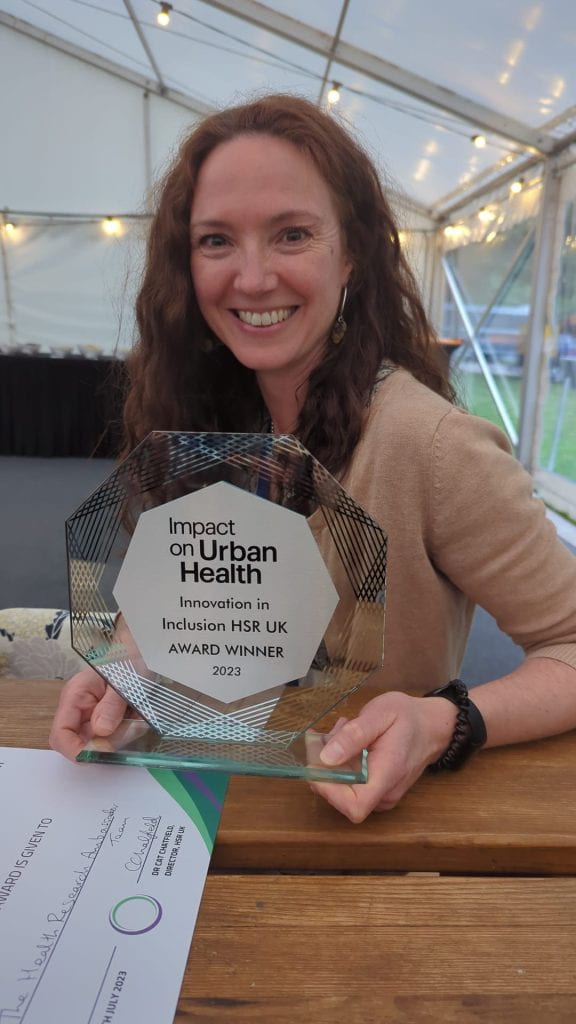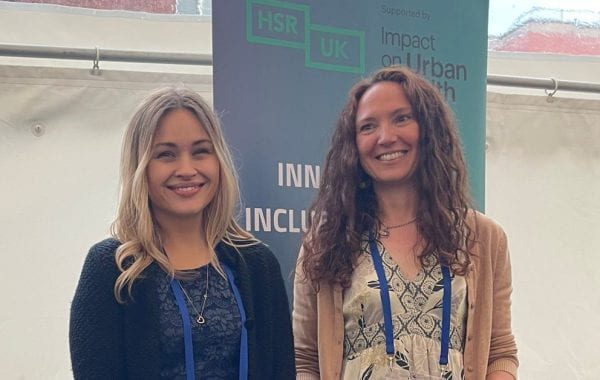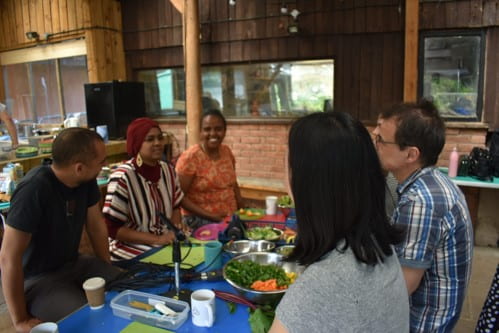6 July 2023
A pilot initiative aiming to build shared, sustainable relationships between researchers and communities in Bristol, North Somerset and South Gloucestershire that are often under-represented in health research, won a Health Services Research (HSR UK) Innovation in Inclusion Award on 5 July 2023.
Funded by the NIHR Centre for Engagement and Dissemination, the NIHR Applied Research Collaboration West (ARC West), the Health Research Ambassador pilot launched in 2022. It is led by People in Health West of England, with involvement from Bristol Health Partners Academic Health Science Centre, and the NIHR Clinical Research Network West of England, ARC West and the BRC.
About the Health Research Ambassador pilot initiative
Under-served communities, including certain ethnic minority communities, frequently carry the heaviest health burden. This is compounded by the fact that there is lower inclusion of people from these communities in health research. There are important differences in how different groups respond to or engage with health interventions. Outcomes may not be the same for all communities. It is therefore important to develop meaningful ways to work with these communities as, in the past, they have often been overlooked or been subject to one off approaches.
The Health Research Ambassadors pilot initiative focused on developing and supporting people from under-served communities to participate directly in making decisions about research that affects their lives. The model was adapted from the successful Black & Green Ambassadors scheme to develop environmental leadership, which was set up by Ujima Radio and Bristol Green Capital Partnership.
The team recruited three former Black and Green Ambassadors – Olivia Sweeney, Roy Kareem and Asia Yousif – to become Health Research Ambassadors. They took part in training, including in public involvement and co-production in health research.
The ambassadors then ran workshops with women who have experience of seeking asylum in the UK. These workshops were co-produced with the women and developed organically, with the women, ambassadors and the research team taking part in activities together. Sessions covered mental health, wellbeing and coping strategies, delivered by a health psychologist, training in understanding and using research evidence, and activities to promote wellbeing such as Tai Chi, aromatherapy and engaging with the Dovetail Orchestra, a local orchestra for migrant communities.
Through taking part, the women shared their experiences and knowledge, and identified their own mental health and wellbeing needs. They also learned about being a Health Research Ambassador and how they might be able to take on this role in the future.
Each workshop was evaluated, and the women provided consistently positive feedback about the sessions, finding them informative and enjoyable. The workshops benefitted them individually and helped build relationships between women from different migrant communities, as well as with the research team. The Health Research Ambassadors quickly facilitated the development of trust and connection with the migrant women that would have been difficult for the research team alone to develop.
The ambassadors have since taken part in an NIHR ARCs national workshop discussing knowledge mobilisation about research and implementation, and one is involved in a NIHR Health Protection Research Unit advisory group.
Health Research Ambassador Olivia Sweeney said:
“It is a great surprise and pleasure to have our work recognised through this award. The project really didn’t feel like work as the research team, ambassadors and women were a brilliant group of people who were open, challenging, friendly and smart. If you think about what we actually did, though, it is really simple: we just talked to people and, importantly, listened. The acknowledgement that this project has got shows how far we have to go with regards to diversity and inclusion, but importantly demonstrates how simple a big impact can be.”
Research team members, Mari-Rose Kennedy and Carmel McGrath, accepted the award at HSR UK’s annual conference on 5 July 2023. Mari said:
“I’m delighted to be accepting this on behalf of the research team and the ambassadors who made this pilot possible. It’s great to see their work being recognised as an example of innovative inclusion.
“We want to ensure that research includes everyone’s voices and represents people’s needs and lived experiences. The success of this pilot initiative provides a platform to expand this way of working with other under-served communities, to develop longstanding, mutually beneficial relationships between communities, research institutions and health and social care providers.”
Health Research Ambassadors and the BNSSG Research Engagement Network
The Health Research Ambassadors pilot initiative is now part of the emerging Bristol, North Somerset and South Gloucestershire (BNSSG) diverse Research Engagement Network, funded by NHS England. The Network, which launched in November 2022, aims to increase diversity in the region’s health research, with an initial focus on race-related health inequalities. Community ownership is at the core of this approach, and the Network is being led by community partners, including Caafi Health.
Find out more about the BNSSG Research Engagement Network.

Further information
About the NIHR
The National Institute for Health Research (NIHR) is the nation’s largest funder of health and care research. The NIHR:
- funds, supports and delivers high quality research that benefits the NHS, public health and social care
- engages and involves patients, carers and the public in order to improve the reach, quality and impact of research
- attracts, trains and supports the best researchers to tackle the complex health and care challenges of the future
- invests in world-class infrastructure and a skilled delivery workforce to translate discoveries into improved treatments and services
- partners with other public funders, charities and industry to maximise the value of research to patients and the economy.
The NIHR was established in 2006 to improve the health and wealth of the nation through research, and is funded by the Department of Health and Social Care. In addition to its national role, the NIHR supports applied health research for the direct and primary benefit of people in low- and middle-income countries, using UK aid from the UK government.

